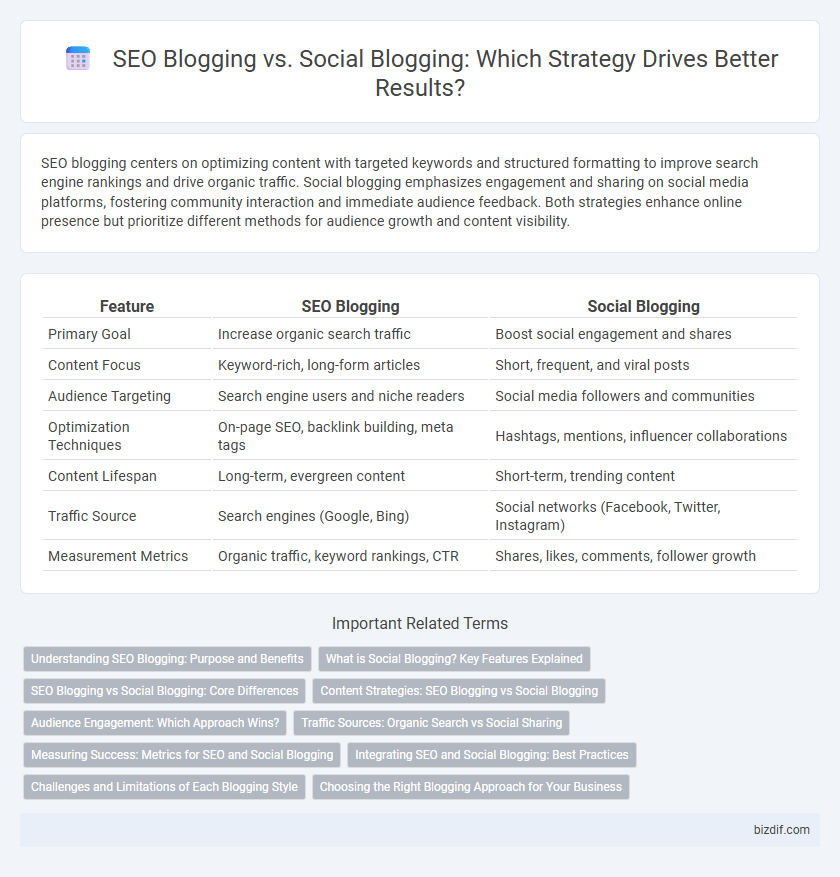SEO blogging centers on optimizing content with targeted keywords and structured formatting to improve search engine rankings and drive organic traffic. Social blogging emphasizes engagement and sharing on social media platforms, fostering community interaction and immediate audience feedback. Both strategies enhance online presence but prioritize different methods for audience growth and content visibility.
Table of Comparison
| Feature | SEO Blogging | Social Blogging |
|---|---|---|
| Primary Goal | Increase organic search traffic | Boost social engagement and shares |
| Content Focus | Keyword-rich, long-form articles | Short, frequent, and viral posts |
| Audience Targeting | Search engine users and niche readers | Social media followers and communities |
| Optimization Techniques | On-page SEO, backlink building, meta tags | Hashtags, mentions, influencer collaborations |
| Content Lifespan | Long-term, evergreen content | Short-term, trending content |
| Traffic Source | Search engines (Google, Bing) | Social networks (Facebook, Twitter, Instagram) |
| Measurement Metrics | Organic traffic, keyword rankings, CTR | Shares, likes, comments, follower growth |
Understanding SEO Blogging: Purpose and Benefits
SEO blogging focuses on creating content optimized for search engines by incorporating relevant keywords, meta tags, and quality backlinks to improve organic search rankings. This approach drives targeted traffic, enhances website visibility, and increases the potential for higher conversion rates. Unlike social blogging, SEO blogging prioritizes long-term audience growth through strategic keyword research and consistent content updates.
What is Social Blogging? Key Features Explained
Social blogging centers on creating and sharing content within social networks to foster engagement, community interaction, and real-time feedback. Key features include user-generated content, integration with social media platforms, interactive elements such as comments and shares, and a focus on conversational and relatable posts. This approach contrasts with SEO blogging, which prioritizes keyword optimization and search engine ranking to attract organic traffic.
SEO Blogging vs Social Blogging: Core Differences
SEO blogging prioritizes keyword optimization, meta descriptions, and backlink strategies to enhance search engine rankings and drive organic traffic. Social blogging focuses on engagement, sharing, and real-time interaction through platforms like Instagram or Twitter, targeting immediate audience connections and viral potential. The core difference lies in SEO blogging's long-term content visibility strategy versus social blogging's emphasis on community building and rapid content dissemination.
Content Strategies: SEO Blogging vs Social Blogging
SEO blogging prioritizes keyword research, optimized headlines, and internal linking to enhance search engine rankings and drive organic traffic. Social blogging focuses on creating shareable, engaging content that resonates with community interests and encourages interaction across social media platforms. Effective content strategies balance SEO techniques with social engagement to maximize visibility and audience growth.
Audience Engagement: Which Approach Wins?
SEO blogging targets specific keywords to drive organic search traffic, enhancing visibility and attracting a niche audience actively seeking information. Social blogging emphasizes real-time interaction and community building on platforms like Instagram or Facebook, fostering immediate engagement and shareability. Audience engagement thrives in social blogging due to interactive features and conversational tone, while SEO blogging sustains long-term, intent-driven traffic with strategic keyword use.
Traffic Sources: Organic Search vs Social Sharing
SEO blogging primarily drives traffic through organic search by optimizing content with targeted keywords, meta tags, and backlinks, which improves visibility on search engines like Google. Social blogging relies on social sharing platforms such as Facebook, Twitter, and Instagram to generate immediate audience engagement and traffic through shares, likes, and comments. Understanding the differences in traffic sources helps bloggers tailor strategies: SEO blogging builds long-term, consistent organic traffic while social blogging often results in short-term bursts of traffic driven by viral social interactions.
Measuring Success: Metrics for SEO and Social Blogging
Measuring success in SEO blogging centers on metrics such as organic traffic, keyword rankings, and backlink quality, which directly impact search engine visibility and long-term content authority. Social blogging relies on engagement metrics like shares, comments, and follower growth to gauge content resonance and community building. Both strategies benefit from tracking conversion rates and time spent on page to assess user interaction and content effectiveness.
Integrating SEO and Social Blogging: Best Practices
Integrating SEO and social blogging enhances content visibility by combining keyword optimization with engaging social media strategies that drive organic traffic. Effective practices include using targeted keywords in blog posts while promoting these posts across social platforms to increase backlinks, shares, and user interaction. Leveraging analytics tools to monitor performance helps refine both SEO and social media tactics, ensuring sustained growth and higher search engine rankings.
Challenges and Limitations of Each Blogging Style
SEO blogging faces challenges such as keyword competition, algorithm changes, and the need for consistent optimization to maintain search engine rankings. Social blogging struggles with rapid content expiration, reliance on platform algorithms for visibility, and difficulty in building long-term audience loyalty. Both styles require strategic content planning but differ fundamentally in traffic generation and engagement sustainability.
Choosing the Right Blogging Approach for Your Business
SEO blogging focuses on optimizing content with targeted keywords, meta descriptions, and backlinks to improve search engine rankings and drive organic traffic. Social blogging emphasizes engagement, sharing, and building community on social media platforms to increase brand visibility and foster relationships. Choosing the right approach depends on your business goals: prioritize SEO blogging for long-term traffic growth and social blogging for immediate interaction and audience connection.
SEO Blogging vs Social Blogging Infographic

 bizdif.com
bizdif.com